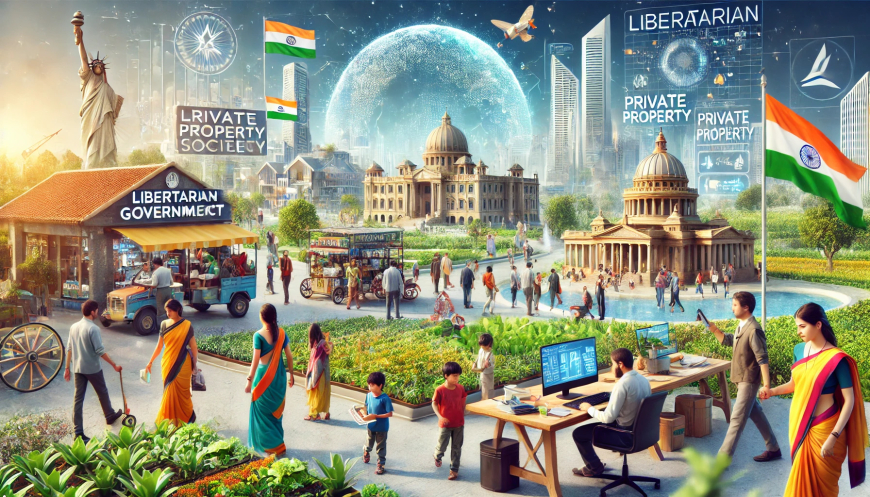Vision of India 2040: A Libertarian Utopia
Explore a compelling vision of India in 2040 under libertarian principles, emphasizing personal freedom, minimal government intervention, and economic empowerment. This article discusses transformative changes in education, a thriving free market economy, streamlined governance, enhanced civil liberties, and environmental stewardship. Discover how these principles could create a vibrant society where individuals can pursue their dreams and contribute to a sustainable future.

Imagine a future where personal freedom, individual choice, and minimal government intervention shape every aspect of life in India. By 2040, under libertarian principles, India could transform into a vibrant society that prioritizes autonomy, innovation, and economic prosperity. Here’s how this vision could unfold:
1. Education Freedom: Empowering Future Generations
Decentralized Education System
In a libertarian India, education would be decentralized, allowing schools and institutions to operate independently. Parents would have the freedom to choose from a diverse array of curricula, catering to every child's unique learning style—from traditional academics to innovative methods like Montessori and unschooling. This education freedom empowers families to make decisions best suited for their children’s growth.
Education as a Marketplace
An open market for education fosters innovation. Schools would compete based on quality and results, driving down costs and enhancing educational outcomes. The focus on market dynamics ensures that students receive a tailored learning experience, preparing them for the future.
Access to Lifelong Learning
Learning never stops. In this future, adults can access a wealth of online courses, workshops, and community programs to upskill or change careers without bureaucratic hurdles. The emphasis is on practical skills and knowledge applicable in the real world, making lifelong learning a standard.
2. Economic Empowerment: Thriving Through Liberty
Free Market Economy
A vibrant free market economy thrives with minimal government intervention. Entrepreneurs would flourish, creating jobs and driving economic innovation. With reduced regulations and lower taxes, starting and growing businesses would be seamless, leading to a diverse and prosperous economy.
Taxation Reforms
Imagine a simplified tax system where individuals keep most of their earnings. This reform would empower people to make financial decisions that promote investment and consumption, enhancing personal freedom and economic growth.
Crypto and Decentralized Finance
The rise of cryptocurrencies and blockchain technology would lead to a more inclusive financial system. People can transact directly, cutting out middlemen and ensuring equal access to financial services, making economic participation accessible to all.
3. Streamlined Governance: Transparency and Trust
Minimal Government
In this vision, the role of government is limited to protecting individual rights, enforcing contracts, and ensuring national defense. Citizens enjoy maximum freedom, free from the burdens of an overreaching bureaucracy.
Direct Democracy and Local Governance
Citizens actively participate in decision-making processes through local councils, allowing for policies that reflect the needs of specific communities. This direct democracy fosters a sense of community and engagement, ensuring that governance is responsive to the people.
Transparent Administration
With open data initiatives, government activities are transparent and accountable. Citizens can easily access information, fostering trust and encouraging civic engagement.
4. Personal Liberties: Unleashing Individual Potential
Enhanced Civil Liberties
Freedoms of speech, association, and religion are vigorously protected. Individuals can express their beliefs and opinions freely, fostering a culture of open dialogue and innovation without fear of censorship.
Choice in Healthcare
A free market in healthcare allows individuals to choose their providers and treatment options. This leads to better services and innovations in health technology, ensuring everyone has access to quality care.
Criminal Justice Reform
The focus shifts from punitive measures to rehabilitation and restorative justice. The criminal justice system emphasizes protecting victims' rights and reintegrating offenders into society, creating a more just and equitable environment.
5. Environmental Stewardship: A Sustainable Future
Private Property and Stewardship
With a focus on private land ownership, individuals and communities take pride in managing and protecting their environment. This encourages innovative practices as people invest in sustainable technologies and conservation efforts.
Market Solutions to Environmental Issues
Businesses innovate to create eco-friendly products and practices driven by consumer demand. Environmental concerns are addressed through voluntary cooperation rather than coercive regulations, ensuring a sustainable future for all.
Conclusion: A Beacon of Liberty
By 2040, India could stand as a beacon of individual freedom and opportunity, where every person has the power to pursue their dreams without unnecessary government interference. This vision reflects a society that values autonomy, creativity, and collaboration, ensuring that every citizen has the chance to thrive.
Join the Movement!
Embrace the vision for a libertarian India. Share this article and help spread the message of freedom, innovation, and empowerment. Together, we can shape a brighter future for all!
#LibertyForIndia #FutureVision2040
Frequently Asked Questions (FAQs)
1. What is the libertarian vision for India?
The libertarian vision for India emphasizes personal freedom, minimal government intervention, and individual choice in various aspects of life, including education, economics, and governance.
2. How would education change in a libertarian India?
Education would become decentralized, allowing parents to choose from diverse curricula. Schools would operate in a competitive market, promoting innovation and tailored learning experiences for every child.
3. What are the economic benefits of a libertarian system?
A libertarian economy fosters entrepreneurship, reduces regulations, and simplifies taxation. This leads to job creation, economic growth, and increased opportunities for individuals to thrive.
4. How does libertarianism address environmental issues?
Libertarianism promotes private property stewardship, encouraging individuals and communities to manage their environments responsibly. Market-driven solutions allow for innovation in sustainability without coercive regulations.
5. What role does government play in a libertarian society?
In a libertarian society, the government’s role is minimal, focusing on protecting individual rights, enforcing contracts, and ensuring national defense. This allows citizens maximum freedom in their personal and economic choices.
What's Your Reaction?

















































